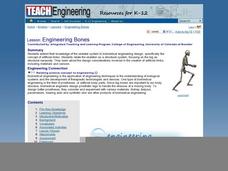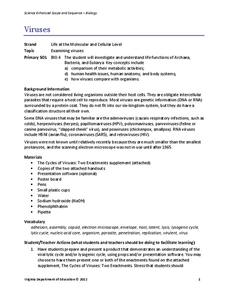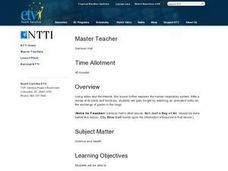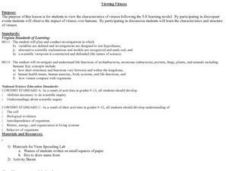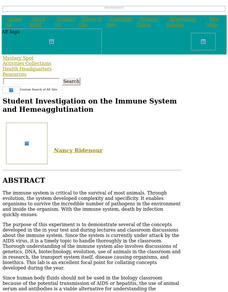Curated OER
Cardiac Arrest! Using Forensics to Investigate Cardiovascular Anatomy and Function
Students identify the different parts and functions of the cardiovascular system. In this forensics lesson, students collect and analyze evidence on a fictional crime. They describe different causes of cardiac arrest.
Curated OER
Anatomy and Physiology "Quickies"
Students use a variety of creative writing tools within this assignment: poems on particular organ systems, write a short story and/or create a word graph. They are involved in a demonstration of lactic build up in the muscles, a...
Curated OER
Meiosis Worksheet
These two pages cover the gamut of topics regarding reproduction and DNA replication. Structures, processes, functions, and reasons for them are tested here. The questions are mostly multiple choice, but there are also a few...
Curated OER
Engineering Bones
Middle schoolers identify the features of a prosthetic limb and explain how engineers are involved in the prosthetic design. For this bone engineering lesson students describe the design criteria that goes into choosing the materials...
Curated OER
The Science of Respiration and Blood Circulation
Fifth graders study how respiration and circulation are connected. In this respiratory lesson plan students complete several activities to better understand heart rate and carbon dioxide in the body.
Curated OER
Science: Put Your Heart into Engineering
Students examine the heart and vascular system and the need for artificial valves. After explaining how heart valves function, they design their own heart valves for experimentation. They predict the speed of fluid flowing through...
Curated OER
Cardiovascular Disease and Fitness: Exploring the Rhythm of Your Pulse
Students explore several examples of cardiovascular diseases. In this anatomy lesson, students explain why physical fitness is very important. They count their pulse rate and record them on a data table.
Curated OER
The Genetics of Antibody Diversity
Students distinguish between the light and heavy chain sections. In this biology lesson, students simulate the DNA splicing process. They calculate antibody diversity using the information given.
Curated OER
Honey Bee Biology
Students review the basic parts of an insect and explore the anatomical characteristics of a honey bee. The second part of the lesson focuses on ways to identify a honey bee from other stinging insects.
Virginia Department of Education
Viruses
Germs, parasites, and viruses, oh my! Facilitate a lesson on viruses as individuals explore functions of Archaea, Bacteria, and Eukarya. They learn how viruses compare with other organisms in nature and how they contribute to health...
Curated OER
What's Living in My Mouth?
Students articulate in written and oral formats that bacteria can be found living everywhere. They explain in written and oral formats why the immune system is necessary. Students are presented with an opportunity to see bacteria alive...
Curated OER
Martian Mummies
Students participate in "Raiders of the Future", a role play about futuristic scientists sending a spaceship to Mars for research and exploration. They collect geological samples for analysis, discover the ruins of an ancient...
Curated OER
Mechanisms to Fight Disease
Students explain how our body fight diseases. In this biology activity, students identify the role of bacteria and viruses in human illness. They create a PowerPoint presentation and essay at the of the unit.
Curated OER
CO2 Blow Out!
Fifth graders determine that carbon dioxide is a gas given off during respiration and that oxygent is the gas that is absorbed during respiration. They determine the air capacity of the lungs.
Curated OER
Dinosaur Tracks: From Stride To Leg Length To Speed
High schoolers determine the relationship between leg length, stride length, and speed in humans and bipedal dinosaurs. They collect data and graph these human characteristics then use actual data collected from dinosaur track pads and...
Curated OER
Crayfish Dissection Worksheet
For this crayfish dissection worksheet, students answer 11 questions about crayfish bodies. One question requires students to label all the parts of a crayfish body.
Curated OER
Viewing Viruses
Students view the characteristics of viruses following the 5-E learning model. By participating in discrepant events Students observe the impact of viruses over humans. By participating in discussion students examine the characteristics...
Curated OER
Learning the Dissecting Planes
Students explore dissecting planes. In this biology lesson plan, students learn the basic vocabulary used in dissection, learn how to orient themselves on a three dimensional figure, and develop the manual dexterity necessary to use...
Curated OER
Making Blood!
Ninth graders study facts about human blood and what it is made of. In this blood composition lesson students divide into groups and complete several activities.
Curated OER
Student Investigation on the Immune System and Hemeagglutination
Students study laboratory protocol for hemagglutination experiments.
Biology Junction
Flatworms
In this flatworms instructional activity, students identify and color the different parts of a flatworm. They complete 14 short answer questions related to the topic.
Curated OER
Hickory Dickory Dock: The Biological Clock
Learners investigate the effect of day length on animal migrations. They view a Powerpoint presentation, identify their own personal migrations and cues, answer discussion questions, and test a hypothesis about seasons.
Curated OER
Testing the Waters
Eleventh graders examine a local body of water. In this science lesson, 11th graders collect water samples to test. Students analyze the data and make conclusions. Students create tables and graphs of the data.
Curated OER
Developing a Public Health Service Message
High schoolers communicate the biological basis for an aspect of a public health issue in a visual manner. They use the basics of a variety of diseases and epidemics to create their Public Health poster and service message.





